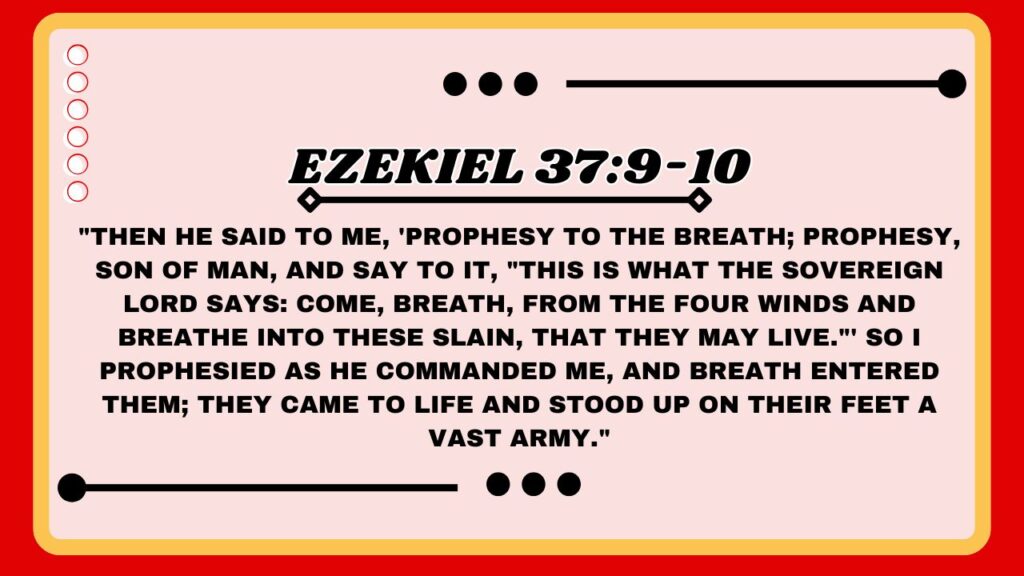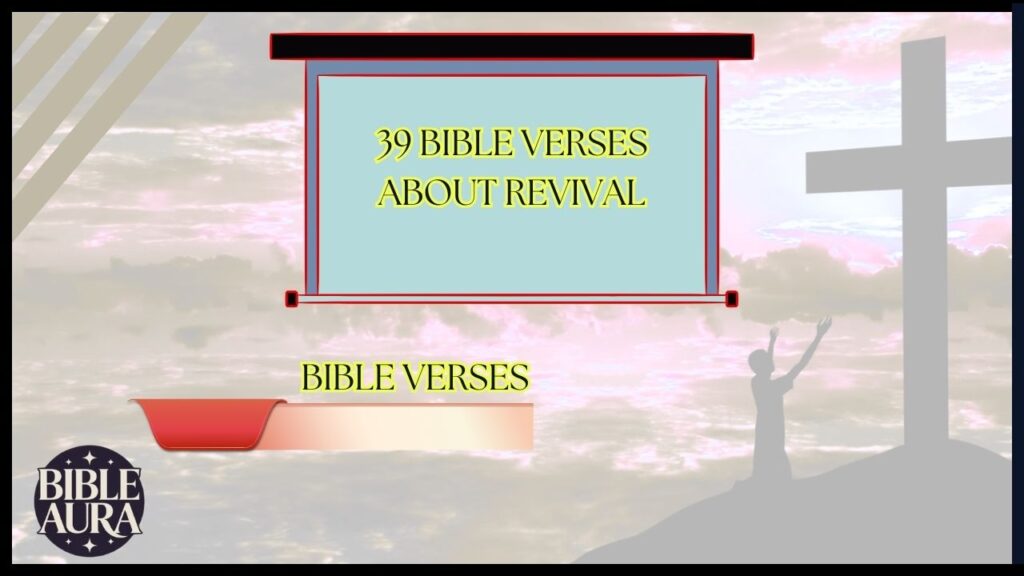Bible Verses About Revival: In an age where spiritual lethargy often creeps into our churches and personal faith, the concept of revival remains as vital as ever. Revival represents a renewed passion for God, a spiritual awakening that transforms individuals and communities with fresh fire from heaven.
Scripture speaks extensively about these seasons of refreshing, offering guidance, hope, and promises for those who seek God’s face. The Bible describes revival as not merely an emotional experience but a profound return to God characterized by repentance, renewal, and restoration.
These 39 verses about revival reveal God’s heart for spiritual awakening and His willingness to restore His people when they turn to Him wholeheartedly. They remind us that revival begins with humility and prayer, spreads through passionate pursuit of God, and results in transformed lives that impact the world around them.
The Foundation of Revival: Humility and Repentance
2 Chronicles 7:14
“If my people, who are called by my name, will humble themselves and pray and seek my face and turn from their wicked ways, then I will hear from heaven, and I will forgive their sin and will heal their land.”
This verse contains God’s response to Solomon after the dedication of the temple. It establishes the foundational elements of revival: humility, prayer, seeking God, and repentance. God promises to respond with forgiveness and healing when His people fulfill these conditions.
Psalm 51:10-12
“Create in me a pure heart, O God, and renew a steadfast spirit within me. Do not cast me from your presence or take your Holy Spirit from me. Restore to me the joy of your salvation and grant me a willing spirit, to sustain me.”

David’s prayer after his sin with Bathsheba demonstrates the personal nature of revival. True revival begins with individuals seeking heart renewal and restoration of spiritual joy. This verse reminds us that revival starts with personal repentance and the desire for God’s presence.
James 4:8-10
“Come near to God and he will come near to you. Wash your hands, you sinners, and purify your hearts, you double-minded. Grieve, mourn and wail. Change your laughter to mourning and your joy to gloom. Humble yourselves before the Lord, and he will lift you up.”
James provides practical steps toward revival: drawing near to God, purification, and genuine sorrow over sin. The promise of being lifted up by God follows the humbling of ourselves. This verse teaches that revival requires both internal heart change and external behavioral change.
Isaiah 57:15
“For this is what the high and exalted One says he who lives forever, whose name is holy: ‘I live in a high and holy place, but also with the one who is contrite and lowly in spirit, to revive the spirit of the lowly and to revive the heart of the contrite.'”
God explicitly states His desire to bring revival to those with humble and repentant hearts. This verse reveals that God’s dwelling place extends from heaven to the hearts of the contrite. It reminds us that God is actively seeking to revive those who recognize their spiritual need.
Joel 2:12-13
“‘Even now,’ declares the LORD, ‘return to me with all your heart, with fasting and weeping and mourning.’ Rend your heart and not your garments. Return to the LORD your God, for he is gracious and compassionate, slow to anger and abounding in love, and he relents from sending calamity.”
Joel calls for genuine heart transformation, not merely external religious rituals. The invitation to return to God is based on His compassionate character. This passage shows that revival involves deep, heartfelt return to God motivated by His loving nature.
Prayer as the Catalyst for Revival
Habakkuk 3:2
“LORD, I have heard of your fame; I stand in awe of your deeds, LORD. Repeat them in our day, in our time make them known; in wrath remember mercy.”
Habakkuk’s prayer demonstrates how recalling God’s past acts of revival can fuel prayers for present renewal. This verse teaches us to pray specifically for God to manifest His power in our generation. It shows that revival prayers are both worshipful and petition-focused.
Acts 4:29-31
“Now, Lord, consider their threats and enable your servants to speak your word with great boldness. Stretch out your hand to heal and perform signs and wonders through the name of your holy servant Jesus.” After they prayed, the place where they were meeting was shaken. And they were all filled with the Holy Spirit and spoke the word of God boldly.”
The early church’s prayer for boldness resulted in a fresh filling of the Holy Spirit. This passage demonstrates that unified, faith-filled prayer precedes revival manifestations. It shows how revival empowers believers for effective witness even in hostile environments.
Psalm 85:6-7
“Will you not revive us again, that your people may rejoice in you? Show us your unfailing love, LORD, and grant us your salvation.”
This direct prayer for revival connects spiritual awakening with renewed joy in God. The psalmist recognizes that revival comes through God’s loving initiative. This verse teaches us to pray expectantly for God’s reviving work while trusting in His faithful love.
Psalm 80:18-19
“Then we will not turn away from you; revive us, and we will call on your name. Restore us, LORD God Almighty; make your face shine on us, that we may be saved.”

This prayer links revival with steadfast devotion to God and continued calling on His name. The imagery of God’s shining face connects revival with divine favor and presence. It teaches that revival both prevents spiritual backsliding and promotes ongoing communion with God.
Ephesians 3:16-19
“I pray that out of his glorious riches he may strengthen you with power through his Spirit in your inner being, so that Christ may dwell in your hearts through faith. And I pray that you, being rooted and established in love, may have power, together with all the Lord’s holy people, to grasp how wide and long and high and deep is the love of Christ, and to know this love that surpasses knowledge that you may be filled to the measure of all the fullness of God.”
Paul’s prayer for the Ephesians provides a template for praying for spiritual renewal. It focuses on inner strengthening, Christ’s indwelling, and experiential knowledge of God’s love. This passage shows that revival involves being filled with God’s fullness and comprehending the dimensions of divine love.
The Word of God and Revival
Psalm 119:25
“I am laid low in the dust; preserve my life according to your word.”
The psalmist connects revival with the life-giving power of God’s word. When we feel spiritually depleted, God’s word becomes the source of renewal. This verse teaches us to seek revival through engagement with Scripture, especially in seasons of spiritual dryness.
Psalm 119:107
“I have suffered much; preserve my life, LORD, according to your word.”
In times of suffering, the psalmist seeks revival through God’s promises. This verse highlights how God’s word sustains us through difficult seasons. It demonstrates that revival isn’t just for times of sin but also for times of sorrow and struggle.
Psalm 119:154
“Defend my cause and redeem me; preserve my life according to your promise.”
The psalmist appeals to God’s redemptive character and faithful promises for personal revival. This verse connects revival with God’s defense of His people. It teaches us to base our prayers for revival on God’s covenant faithfulness.
Isaiah 55:10-11
“As the rain and the snow come down from heaven, and do not return to it without watering the earth and making it bud and flourish, so that it yields seed for the sower and bread for the eater, so is my word that goes out from my mouth: It will not return to me empty, but will accomplish what I desire and achieve the purpose for which I sent it.”
God promises that His word produces spiritual fruitfulness just as surely as rain produces crops. This passage assures us that when God’s word is proclaimed, spiritual renewal will follow. It teaches that revival comes through the faithful declaration of Scripture.
Hebrews 4:12
“For the word of God is alive and active. Sharper than any double-edged sword, it penetrates even to dividing soul and spirit, joints and marrow; it judges the thoughts and attitudes of the heart.”
This verse describes the penetrating power of Scripture to bring conviction and transformation. Revival comes as God’s word exposes what needs to change in our hearts. It reminds us that true revival involves not just emotional experiences but deep heart transformation through God’s word.
Also Read: 39 Important Bible Verses About Long Life
The Holy Spirit’s Role in Revival
Ezekiel 37:9-10
“Then he said to me, ‘Prophesy to the breath; prophesy, son of man, and say to it, “This is what the Sovereign LORD says: Come, breath, from the four winds and breathe into these slain, that they may live.”‘ So I prophesied as he commanded me, and breath entered them; they came to life and stood up on their feet a vast army.”

Ezekiel’s vision of dry bones coming to life illustrates the Holy Spirit’s power to revive what seems spiritually dead. This dramatic picture shows that no situation is beyond God’s reviving power. It teaches that revival comes through the life-giving breath of God’s Spirit.
Joel 2:28-29
“And afterward, I will pour out my Spirit on all people. Your sons and daughters will prophesy, your old men will dream dreams, your young men will see visions. Even on my servants, both men and women, I will pour out my Spirit in those days.”
Joel prophesies a widespread outpouring of God’s Spirit that crosses gender, age, and social barriers. This promise, fulfilled initially at Pentecost, continues to inspire prayers for fresh outpourings. It shows that revival through the Spirit is meant to be inclusive and multigenerational.
Acts 2:17-18
“‘In the last days, God says, I will pour out my Spirit on all people. Your sons and daughters will prophesy, your young men will see visions, your old men will dream dreams. Even on my servants, both men and women, I will pour out my Spirit in those days, and they will prophesy.'”
Peter quotes Joel’s prophecy to explain the Pentecost phenomena, showing that spiritual revival was always God’s plan. This passage connects the Old Testament promise with New Testament fulfillment. It demonstrates that revival through the Spirit results in prophetic proclamation and supernatural manifestations.
Acts 1:8
“But you will receive power when the Holy Spirit comes on you; and you will be my witnesses in Jerusalem, and in all Judea and Samaria, and to the ends of the earth.”
Jesus promises Spirit-empowerment for effective witness, a key aspect of revival. This verse connects the infilling of the Spirit with evangelistic mission. It teaches that genuine revival always results in expanded witness and kingdom advancement.
Titus 3:5-6
“He saved us, not because of righteous things we had done, but because of his mercy. He saved us through the washing of rebirth and renewal by the Holy Spirit, whom he poured out on us generously through Jesus Christ our Savior.”
Paul describes salvation itself as a work of spiritual renewal through the Holy Spirit. This verse reminds us that the same Spirit who brings initial salvation continues the work of renewal. It highlights the generous nature of God’s Spirit-outpouring through Christ.
The Fruits of Revival
Isaiah 61:3
“…to bestow on them a crown of beauty instead of ashes, the oil of joy instead of mourning, and a garment of praise instead of a spirit of despair. They will be called oaks of righteousness, a planting of the LORD for the display of his splendor.”
This verse describes the transformative results of God’s reviving work: beauty, joy, and praise replacing negative conditions. The metaphor of strong oaks shows the stability that comes through revival. It teaches that revival produces visible change that displays God’s glory.
Hosea 6:1-3
“Come, let us return to the LORD. He has torn us to pieces but he will heal us; he has injured us but he will bind up our wounds. After two days he will revive us; on the third day he will restore us, that we may live in his presence. Let us acknowledge the LORD; let us press on to acknowledge him. As surely as the sun rises, he will appear; he will come to us like the winter rains, like the spring rains that water the earth.”
Hosea describes revival as healing after discipline, using resurrection imagery. The passage promises God’s appearance to those who persistently seek Him. It teaches that revival involves returning to God after seasons of discipline, with confidence in His restoring power.
Isaiah 35:1-2
“The desert and the parched land will be glad; the wilderness will rejoice and blossom. Like the crocus, it will burst into bloom; it will rejoice greatly and shout for joy. The glory of Lebanon will be given to it, the splendor of Carmel and Sharon; they will see the glory of the LORD, the splendor of our God.”
Isaiah portrays revival through the image of desert places blooming with life and beauty. This metaphor illustrates how revival transforms spiritual barrenness into fruitfulness. It shows that revival leads to witnessing God’s glory in previously desolate circumstances.
Psalm 126:5-6
“Those who sow with tears will reap with songs of joy. Those who go out weeping, carrying seed to sow, will return with songs of joy, carrying sheaves with them.”
This verse promises that faithful ministry during difficult times will eventually yield joyful harvest. It encourages perseverance in spiritual labors even when revival seems distant. The verse teaches that tears of intercession and evangelistic effort precede the joy of revival.
Acts 3:19-20
“Repent, then, and turn to God, so that your sins may be wiped out, that times of refreshing may come from the Lord, and that he may send the Messiah, who has been appointed for you even Jesus.”
Peter connects repentance with experiencing “times of refreshing” from God’s presence. This passage links revival with both forgiveness of sins and anticipation of Christ’s return. It teaches that revival includes both immediate spiritual renewal and eschatological hope.
Revival in the Church and Community
Revelation 2:4-5
“Yet I hold this against you: You have forsaken the love you had at first. Consider how far you have fallen! Repent and do the things you did at first. If you do not repent, I will come to you and remove your lampstand from its place.”
Christ calls the Ephesian church to revive their first love through remembrance, repentance, and renewed obedience. This passage shows that even faithful churches can need revival of love for Christ. It teaches that maintaining passionate devotion requires ongoing vigilance and renewal.
Psalm 85:10-11
“Love and faithfulness meet together; righteousness and peace kiss each other. Faithfulness springs forth from the earth, and righteousness looks down from heaven.”

The psalmist describes the beautiful harmony of divine attributes manifested during revival. This poetic picture illustrates how revival brings reconciliation between seemingly opposing virtues. It shows that revival creates a spiritual environment where God’s character is displayed in balanced fullness.
Psalm 22:27
“All the ends of the earth will remember and turn to the LORD, and all the families of the nations will bow down before him.”
This verse envisions global revival where all peoples turn to God in worship. It extends the scope of revival beyond individual or local experiences to worldwide impact. The verse teaches us to pray for and work toward revival that reaches every nation and family.
Habakkuk 2:14
“For the earth will be filled with the knowledge of the glory of the LORD as the waters cover the sea.”
Habakkuk prophesies a time when God’s glory will be universally known, the ultimate revival goal. This verse provides a compelling vision of complete spiritual awakening. It teaches that true revival spreads God’s glory comprehensively, leaving no area untouched.
Romans 8:11
“And if the Spirit of him who raised Jesus from the dead is living in you, he who raised Christ from the dead will also give life to your mortal bodies because of his Spirit who lives in you.”
Paul connects the resurrection power that raised Christ with the Spirit’s life-giving work in believers. This verse assures us that the same power that accomplished history’s greatest miracle is available for spiritual revival. It teaches that revival comes through the indwelling resurrection power of the Holy Spirit.
Also Read: 36 Important Bible Verses About Karma
Perseverance in Seeking Revival
Lamentations 5:21
“Restore us to yourself, LORD, that we may return; renew our days as of old.”
Jeremiah prays for national restoration after Jerusalem’s destruction, recognizing that revival begins with God’s initiative. This verse acknowledges our dependence on God to enable our return to Him. It teaches that revival requires both divine restoration and human response.
Psalm 80:3
“Restore us, O God; make your face shine on us, that we may be saved.”
This repeated refrain in Psalm 80 connects revival with experiencing God’s favorable presence. The imagery of God’s shining face emphasizes the relational aspect of revival. It teaches us to persistently seek God’s face as the source of spiritual renewal.
Psalm 143:11
“For your name’s sake, LORD, preserve my life; in your righteousness, bring me out of trouble.”

David appeals to God’s reputation and character as the basis for personal revival. This verse shows that seeking revival is not self-centered but God-centered. It teaches us to ground our prayers for revival in God’s glory rather than merely personal benefit.
Galatians 6:9
“Let us not become weary in doing good, for at the proper time we will reap a harvest if we do not give up.”
Paul encourages perseverance in faithful service, promising eventual fruitfulness. This verse addresses the discouragement that can come when revival seems delayed. It teaches that persistent spiritual labor will yield revival fruit in God’s timing.
Isaiah 40:31
“But those who hope in the LORD will renew their strength. They will soar on wings like eagles; they will run and not grow weary, they will walk and not be faint.”
Isaiah promises renewed strength to those who wait expectantly on God. This verse connects personal revival with patient trust in God’s timing. It teaches that spiritual renewal comes to those who maintain hope in God despite circumstances.
Historical Examples of Revival
2 Kings 23:25
“Neither before nor after Josiah was there a king like him who turned to the LORD as he did with all his heart and with all his soul and with all his strength, in accordance with all the Law of Moses.”
This verse highlights King Josiah’s wholehearted turning to God that sparked national revival. His example demonstrates how leadership commitment to God’s word catalyzes broader awakening. It teaches that revival often spreads from influential individuals who fully commit to God’s ways.
2 Chronicles 15:12-15
“They entered into a covenant to seek the LORD, the God of their ancestors, with all their heart and soul… They took an oath to the LORD with loud acclamation, with shouting and with trumpets and horns. All Judah rejoiced about the oath because they had sworn it wholeheartedly. They sought God eagerly, and he was found by them. So the LORD gave them rest on every side.”
This passage describes the joyful commitment and corporate seeking of God during Asa’s revival. The public covenant and celebration show the community aspect of revival. It teaches that revival involves corporate commitment, enthusiastic worship, and whole-hearted seeking that results in God’s manifest presence.
Nehemiah 8:5-6
“Ezra opened the book. All the people could see him because he was standing above them; and as he opened it, the people all stood up. Ezra praised the LORD, the great God; and all the people lifted their hands and responded, ‘Amen! Amen!’ Then they bowed down and worshiped the LORD with their faces to the ground.”
This scene depicts revival through public Scripture reading that produced reverent worship. The people’s physical posture reflected their spiritual receptivity. It shows that revival often centers around rediscovering God’s word and responding with appropriate reverence and worship.
Acts 19:18-20
“Many of those who believed now came and openly confessed what they had done. A number who had practiced sorcery brought their scrolls together and burned them publicly… In this way the word of the Lord spread widely and grew in power.”

Luke describes a revival in Ephesus characterized by public confession and decisive break with sinful practices. The dramatic destruction of valuable occult items demonstrated genuine repentance. This passage teaches that revival produces tangible lifestyle changes and creates an environment where God’s word spreads effectively.
Conclusion: Bible Verses About Revival
These 39 Bible verses about revival reveal God’s consistent pattern of renewing His people throughout history. They show us that revival is not a modern invention but a biblical reality that God desires to repeat in every generation. From the personal restoration of David to the corporate awakening under Josiah to the Spirit’s outpouring at Pentecost, God has demonstrated His commitment to reviving His people.
The scriptures make clear that revival begins with humility and repentance, is fueled by prayer and God’s word, is empowered by the Holy Spirit, and results in transformed lives and communities. While we cannot manufacture revival, we can position ourselves to receive it by following these biblical principles.
As we seek God for revival in our day, these verses remind us that God is faithful to His promises. He still responds to humble, repentant hearts that seek His face. He still pours out His Spirit on those who earnestly pray. And He still transforms individuals, churches, and societies through the power of spiritual awakening.
How to Use These Revival Verses in Your Spiritual Life
- Create a Revival Prayer Journal: Write these verses in a journal and use them to guide your prayers for personal and corporate revival. Note specific applications and answered prayers.
- Develop a Revival Bible Study: Use these verses as the foundation for a small group study on revival. Discuss the principles, pray through the verses, and share personal testimonies of spiritual renewal.
- Incorporate into Church Services: Share these verses during worship services, perhaps focusing on one verse or theme per week, to cultivate revival expectation in your congregation.
- Memorize Key Revival Promises: Commit verses like 2 Chronicles 7:14 or Psalm 85:6 to memory, meditating on them throughout your day to maintain revival focus.
- Use in Personal Devotions: Begin each day by reading one revival verse and asking God to apply its truth to your life, creating a 39-day revival devotional journey.
- Share on Social Media: Post these verses with brief reflections to inspire others and spread the message of revival beyond your immediate circle.
- Create Visual Reminders: Print key revival verses on cards to place around your home or workplace as constant reminders of God’s revival promises.
Frequently Asked Questions About Revival
What exactly is revival according to the Bible?
Biblical revival is a sovereign work of God that brings spiritual renewal, restored passion for God, increased obedience to His word, and fresh empowerment by the Holy Spirit. It involves both returning to God after spiritual decline and experiencing greater depths of His presence and power.
Can revival be manufactured or programmed?
While we cannot create revival through human methods or scheduling, we can prepare for it by following biblical principles: humble repentance, fervent prayer, engagement with Scripture, and obedient response to God’s leading. Revival ultimately remains God’s work, given according to His sovereign timing.
Is revival only for churches or can individuals experience it too?
Revival can occur at both personal and corporate levels. Many scriptures address individual spiritual renewal, like David’s prayer in Psalm 51. Personal revivals often precede and contribute to larger corporate movements of God’s Spirit.
How do I know if I need revival?
Signs that indicate need for revival include diminished love for God and others, reduced passion for prayer and Scripture, tolerance of sin, lack of spiritual fruit, minimal concern for the lost, and decreased sensitivity to the Holy Spirit’s leading.
How long does revival typically last?
There is no standard duration for revival. Historical revivals have lasted from a few weeks to several years. Rather than focusing on timeframes, we should remain responsive to God’s Spirit for as long as He chooses to work in heightened ways.
What is the relationship between evangelism and revival?
Revival typically intensifies evangelism as renewed believers naturally share their faith with greater boldness and effectiveness. Many historical revivals led to significant evangelistic harvests as the revived church reached out to the surrounding community.
Can revival occur outside the church?
While revival often begins within the church, its effects frequently spread beyond to impact wider society. True revival ultimately influences culture, ethics, and social structures as transformed believers live out their faith in all areas of life.
Read more knowledgeable blogs on Bible Aura

Piper McMillan is a passionate writer and educator dedicated to sharing the beauty and depth of the Bible. As the author behind the Piper McMillan website, she explores Bible verses, unlocks biblical narratives, and provides insights for living a Christ-centered life. Through warm, approachable, and inspiring articles, Piper guides readers to deepen their understanding of Scripture and apply its timeless wisdom to daily living. Her mission is to uplift, educate, and help others walk faithfully with God, rooted in His word.



